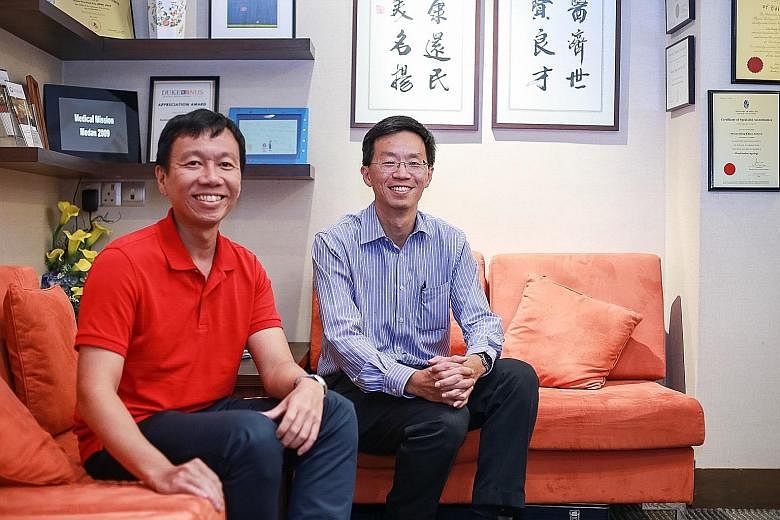Often located deep within a person's head, many nose cancers are discovered only by chance.
This was the case for Mr Wongso Shianturi Wijaya, whose nose started bleeding two days after he got into a traffic accident in 2013.
When it didn't stop, he went to head and neck surgeon Andrew Loy, who found a 2cm tumour deep inside his nose.

"If not for (the accident), I would never have checked," the 41-year- old IT manager told The Straits Times. "Before that everything was normal, and I even finished a half- marathon. It was really a shock."
Nose cancer is the most common head and neck cancer in Singapore, and the eighth-most common cancer among Singaporean men. Between 350 to 400 new cases are diagnosed each year.
Asians, especially Chinese people from South-east Asia and Southern China, are particularly susceptible, said Dr Loy, who is from Mount Elizabeth Hospital.
The exact causes of this cancer are not known yet. However, Dr Kiattisa Sommat, an associate consultant at the radiation oncology division at the National Cancer Centre Singapore (NCCS), said research has thrown up some clues.
"Risk factors include genetic or family history, Epstein-Barr virus infections, frequent consumption of preserved food and smoking," she said.
Symptoms of this cancer include nosebleeds or blockages, painless lumps in the neck, and blocked or ringing ears. People with this cancer may also experience unusual numbness or pain in the face.
"As the cancer is hidden deep in the nasal cavity, most cases present (themselves) in the late stages when people have (these) symptoms," Dr Loy said.
"Anyone with suspicious symptoms should be seen for a simple nasal endoscopy which can pick up the cancer easily and potentially be cured."
The standard treatment is radiotherapy, occasionally with chemotherapy as well. Surgery is not usually the first-line treatment because of how deep such cancers are located, Dr Sommat said.
In Mr Wongso's case, he underwent radiotherapy five days a week, and chemotherapy at the start of each week. On top of that, he had to remove four of his wisdom teeth.
"(Doctors) were scared that if there was infection later, they wouldn't be able to do surgery because of the radiotherapy and chemotherapy," said the Indonesian, a permanent resident here.
His treatment started in June, and by September he had recovered enough to go back to work. Even then, one of his ears remained blocked for around a year due to an infection, and would occasionally bleed.
Recalling his frustration at that time, he said: "I couldn't hear clearly, and I couldn't gauge if I was talking too loudly or too softly."
Three years on, however, he has recovered and visits Dr Loy only for regular checkups. However, he said, the brush with cancer has driven him to live more healthily.
He goes jogging at least three times a week and has cut down on sugar and alcohol.
His advice to those going through cancer treatment is simple: focus on the present, and don't let anxiety overtake you.
"Don't try to overthink things and think about what will happen," he said.
"Every day, solve one problem at a time, because a lot of things are out of your control."
• For further inquiries on nasopharyngeal cancer, please call the National Cancer Centre Singapore helpline on 6225-5655 or e-mail cancerhelpline@nccs.com.sg. You can also call Parkway Cancer Centre's hotline on 6738- 9333.
• Next week: Breast Cancer
Find out more about cancer and how to fight it on ST's Fighting Cancer microsite.


